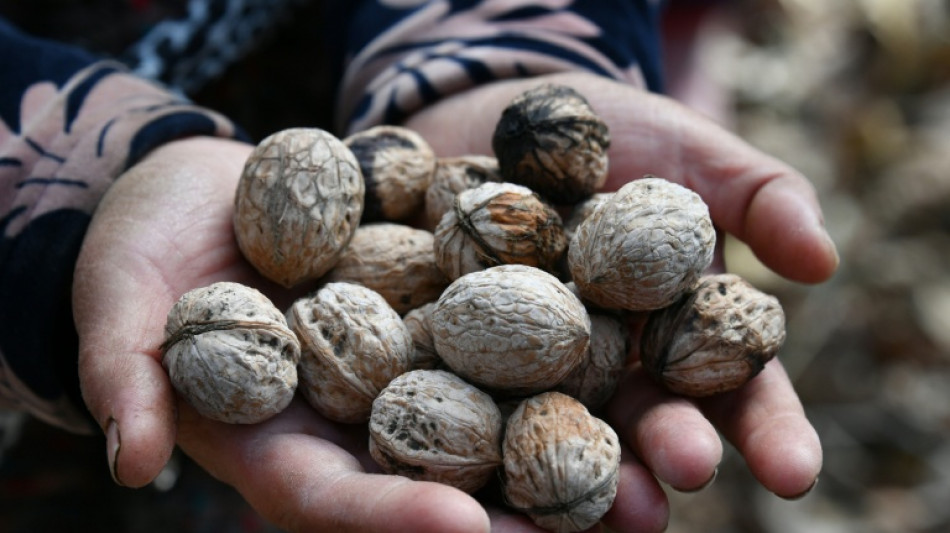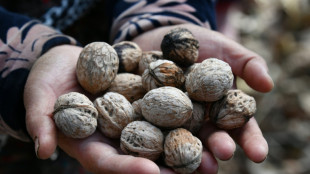
-
 Burberry narrows first half loss on turnaround plan
Burberry narrows first half loss on turnaround plan
-
Sri Lanka to stay in Pakistan after bomb, games move to Rawalpindi

-
 Zanzibar women turn to sponge farming as oceans heat up
Zanzibar women turn to sponge farming as oceans heat up
-
Stocks rise with focus on Fed, tech as US government reopens

-
 Curry lifts Warriors over Spurs, Thunder rout Lakers, Jokic shines
Curry lifts Warriors over Spurs, Thunder rout Lakers, Jokic shines
-
Mushroom material takes on plastic packaging at Belgian start-up

-
 India's top tennis player says denied China visa
India's top tennis player says denied China visa
-
In Kyrgyzstan, world's largest natural walnut forest thins away

-
 TV soaps and diplomacy as Bangladesh and Turkey grow closer
TV soaps and diplomacy as Bangladesh and Turkey grow closer
-
Striking Boeing defense workers to vote on latest contract

-
 Australia's opposition ditches commitment to net zero emissions
Australia's opposition ditches commitment to net zero emissions
-
Duffy takes four as New Zealand crush West Indies to seal T20 series

-
 South Korea halts flights for college entry exam
South Korea halts flights for college entry exam
-
Trump signs bill to end record-breaking US shutdown

-
 EU lawmakers to vote on unpicking green business rules
EU lawmakers to vote on unpicking green business rules
-
Smith says England speed kings could struggle in Ashes

-
 Stocks stutter with focus on Fed, tech after US reopen vote
Stocks stutter with focus on Fed, tech after US reopen vote
-
Record-breaking US shutdown ends as political fallout begins

-
 France marks decade since harrowing Paris attacks
France marks decade since harrowing Paris attacks
-
Skubal, Skenes win MLB Cy Young Awards for top pitchers

-
 Record rains turn Argentina's farm-filled Pampas plains to wetlands
Record rains turn Argentina's farm-filled Pampas plains to wetlands
-
Solar storm brings new chance of vivid auroras, signal disruptions

-
 Gauff and Fritz back for United Cup against Swiatek's Poland
Gauff and Fritz back for United Cup against Swiatek's Poland
-
World's fossil fuel emissions to hit new record in 2025: study

-
 BMS Holdings Berhad Sets To Raise RM80.08 Million From Ace Market IPO Exercise
BMS Holdings Berhad Sets To Raise RM80.08 Million From Ace Market IPO Exercise
-
Empire Metals Limited Announces Appointment of Joint Corporate Broker

-
 US jury: Boeing owes $28 mn to family of Ethiopian Airlines crash victim
US jury: Boeing owes $28 mn to family of Ethiopian Airlines crash victim
-
G7 calls for urgent Ukraine ceasefire, de-escalation in Sudan

-
 Bayern stun Arsenal, Man Utd sink PSG in Women's Champions League
Bayern stun Arsenal, Man Utd sink PSG in Women's Champions League
-
New Epstein emails claim Trump 'knew about the girls'

-
 Brazil tribal chief ready to give Lula a 'talking-to'
Brazil tribal chief ready to give Lula a 'talking-to'
-
Clippers' Beal to have season-ending surgery - report

-
 Dow ends at record on hopes US government will reopen
Dow ends at record on hopes US government will reopen
-
Portugal's Ronaldo hoping Ireland fans boo him

-
 England set for Etihad start to Euro 2028 tournament campaign
England set for Etihad start to Euro 2028 tournament campaign
-
Sinner cruises past Zverev and into last four of ATP Finals

-
 US presses final penny after more than 230 years
US presses final penny after more than 230 years
-
Baxter says England must be 'selfless' to see off All Blacks

-
 Pardoned French-Algerian writer Sansal arrives in Germany
Pardoned French-Algerian writer Sansal arrives in Germany
-
Bayern battle back to shock Arsenal in Women's Champions League

-
 China hopes US will 'some day' return to climate fold, official tells AFP
China hopes US will 'some day' return to climate fold, official tells AFP
-
Trump 'knew about the girls,' new Epstein emails claim

-
 Scotland 'optimistic' Russell will be fit to face Argentina
Scotland 'optimistic' Russell will be fit to face Argentina
-
Big platforms chart gradual path to self-driving at Web Summit

-
 Jane Goodall honored in Washington by conservationists including DiCaprio
Jane Goodall honored in Washington by conservationists including DiCaprio
-
Tuberculosis killed 1.23 million last year: WHO

-
 New Zealand coach Robertson says Twickenham visit is 'why I'm doing the job'
New Zealand coach Robertson says Twickenham visit is 'why I'm doing the job'
-
Hopes of US shutdown deal fail to sustain market rally

-
 US military personnel do not risk prosecution for drug strikes: Justice Dept
US military personnel do not risk prosecution for drug strikes: Justice Dept
-
Jailed writer Sansal on way to Germany after Algeria pardon


In Kyrgyzstan, world's largest natural walnut forest thins away
Rustling through fallen golden leaves, locals in a forest outside Arslanbob in the Kyrgyz mountains were scurrying for walnuts -- an ancient pastime and economic lifeline for the region.
But the forest, the world's largest wild walnut grove, has for years been slowly fading -- hit by the overgrazing of livestock, illegal logging and rising temperatures.
"The forest used to be so dense but it has thinned out," said Asel Alisheva, a pensioner from the village, officially known as Arslanbap, who has been foraging there for decades.
She was once afraid to venture too far into the wood.
"It used to be impossible to walk through. Now there are so many people," she told AFP.
"The difference is striking," the 70-year-old added as she cracked walnuts in a roadside tent.
Locals have gathered the earthy tough-shelled nuts here for generations.
They are both an economic staple and a symbol of the Jalal-Abad region.
"Nowhere else in the world is there such a large concentration of natural walnut forests," said regional forestry expert Zakir Sarymsakov.
He also highlighted the "vast variety" of walnut species that can be found in the region.
For locals, walnuts are a bread-and-butter issue.
"This is how we make a living. There are no other ways, only walnuts. This is how we feed our children," said Arno Narynbaeva, 53, who has been picking them since childhood.
- Poor harvests -
At the bustling village bazaar, men stack bulging walnut sacks, while women do the trade.
But business has seen better days -- the harvests have been poor lately.
"In the 2000s, we used to receive large quantities, up to 15 tonnes per day. These days, we get three to four, and it decreases year by year," seller Zhazgul Omurzakova said.
"The climate is getting hotter and drier every year, and the nuts are losing their quality, turning red inside," the 47-year-old said.
Whiter kernels are worth more as the nuts' visual appeal is important for pastry-makers.
"Hot weather harms the walnuts. They fall, burn, and turn black," said picker Narynbaeva.
"We have never seen this happen before."
Average temperatures in Central Asia have risen by about 1.5C since 1991, twice the global average, according to the World Meteorological Organization (WMO), a UN climate agency.
More frequent droughts that accompany the hotter weather have also hit the walnut groves.
Locals are trying to address the problem, including by seeding millions of trees in the Arslanbob forest nursery.
But water shortages, chronic across Central Asia, have hit those efforts.
"Over the past two to three years, there has been no rain, and it has become hot," said Temir Emirov, who works in the tree nursery.
"The ground has dried out, and the grass has withered," he added.
"The seedlings haven't received water for a month and are using their own moisture to survive."
- 'Big plans' -
Other human activity is also taking a toll on the forest.
"Since we don't have pastures, livestock is a problem," said chief forest ranger Ibragim Turgunbekov.
Cattle herds, expanding in size and number, have trampled the soil and eaten young shoots.
Illegal logging -- with locals preferring trees over more expensive coal for firewood -- has also thinned out the forest.
Ranger Turgunbekov issues fines and tries to convince farmers to reduce the size of their herds.
Local imams have even called on their followers to help preserve the walnut trees.
Some want stricter measures, such as taxing surplus livestock or a government ban on grazing near settlements.
Turgunbekov said a solution could be better utilising the walnuts' economic potential.
"If we make perfumes or oils out of walnuts and ship them to Europe, their value will increase," he said.
"By selling at higher prices, locals will be more motivated and will take better care of the forest."
Abdulaziz Khalmuradov, 16, is one of the region's young people trying to do just that.
After school, he makes walnut oil using a traditional press.
"I want to increase the number of machines and produce not only walnut oil but also many other types, such as apricot oil," the aspiring entrepreneur told AFP.
He also wants to push sustainable tourism to the region.
"Tourism in Arslanbob is underdeveloped. If the number of tourists increases, volumes will increase," he told AFP.
"When I grow up, I have big plans."
D.Kaufman--AMWN
